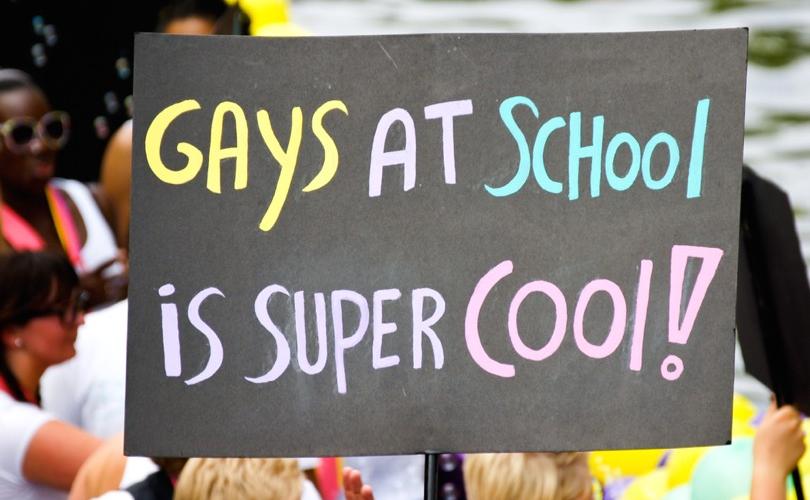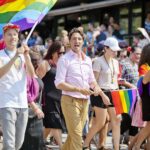Blog Post
‘Queer theory’ scholar confirms parental concerns about purpose of gay clubs in Christian schools
By Jonathon Van Maren
Earlier this week, a Catholic blogger tipped me off on Twitter, sending me the link to a PhD thesis published earlier this month titled, “Gay-Straight Alliances and Student Activism in Ontario Public Secular and Catholic High Schools,” written by Alicia A. Lapointe of the University of Western Ontario. Lapointe’s thesis essentially confirms what many parental rights advocates have been pointing out for years: That the prime function of GSAs is not simply to be a “support group,” as LGBT activists have claimed. Rather, these groups are intended to be a way of promoting a specific ideological agenda within the school system, especially within the Catholic school system.
Lapointe is up front about this, laying out her thesis as an “in-depth examination of the educative and activist function of the GSAs in two public and two public Catholic Ontario secondary schools,” which she conducts through the lens of “queer theory,” “critiquing the heteronormative underpinnings of schooling” as well as scrutinizing the “cisnormative infrastructure.” Not only does Lapointe lay out the activist role of GSAs within the Catholic school system, but she expresses frustration throughout her work whenever she feels that this activism is being inhibited by Catholic doctrine, and advocates directly for the ideologies she seeks to promote to be integrated directly into the school system. Her work, writes Lapointe, resulted in three major themes coming forward:
1: each GSA was a student-driven democratizing space that enabled youth to explore and circulate antihetero/cisnormative discourses (Fraser, 1990); 2) all GSAs served as a proxy in the absence of an ongoing systemic commitment to queer and trans-informed education; and 3) pastoral care and its regulatory moral authority within Catholic education impeded GSA development and functioning (Martino, 2014). The implications of the study are outlined in terms of the need for systemic support for anti-heteronormative and anti-cisnormative education so that the burden and responsibility for this education does not just fall on the shoulders of GSA members and gender and sexual minority youth in particular.
Throughout her thesis, Lapointe excoriates educators for not doing enough to promote the GSA clubs, even writing that when the student leaders of these clubs were given the opportunity to spread their message that this was a cop out, because educators should be promoting these ideologies themselves rather than relying on students:
If the board and educators fulfilled their educational duties, perhaps GSA members would not feel obligated to engage in queer- and trans-informed education and activism. Overall, by provoking the GSA to take on such a leadership role, the board abnegated its responsibility for providing education and resources that are needed to educate about sexual and gender diversity necessary for teachers to feel confident in addressing anti-hetero/cisnormativity in a more sustained manner through policy and curricular development
In other words, Lapointe feels that educators should be combatting “cisnormativity” – essentially, that queer theory should inform our entire educational system, including the Catholic school system. When GSA leaders attempted to make an assembly on LGBT issues mandatory and teachers instead insisted it be optional, Lapointe presents this as a grossly unfair decision – she believes that all students should be subject to her ideology. The teachers’ decision, she said, “exposed the extent to which heterosexual and cisgender regimes of truth are maintained at school. The censoring of a sexuality and gender-related assembly resembled the pervasiveness of heteronormativity and cisnormativity in GSA members’ formal education.” Notice here that Lapointe’s definition of censorship is not making something mandatory – a very revealing insight into the mind of a queer theory activist.
Lapointe also approvingly cites sessions where GSA activists present the concepts of “intersectionality” to educators in order for them to incorporate those concepts in their teaching and begin to root out the “heternormativity” that “underpins” their educational culture. Terms like “lesbophobia” and “heterosexism” were introduced, just in case anyone ran out of phobias and needed more. Activities like this, writes Lapointe, are “undeniably powerful because…’the GSA used the formal structures and practices of the school in order to transform it.’”
Lapointe’s analysis of Catholic schools is even more interesting. She cites the GSAs as a method of undermining Catholic teaching within the school system, and presents “minority rights” as conflicting with “religious freedom.” She quotes GSA activists explaining that their goal is to mainstream their ideologies within the school system – gone is any of the language of “support” that was used to justify the existence of these clubs in the first place. In many instances, the GSA activists have been extremely successful at both swaying students to their ideological position, as well as recruiting many educators to their cause. In each instance, Catholic doctrine is seen as an obstacle to overcome and neutralize as an influence in the Catholic schools.
If you want to know where activists like Lapointe and her allies in the GSA clubs want to go, consider this: Lapointe refers to “religious freedom” as nothing more than “a guise for religious bigotry.” LGBT activists have been saying this for years: Not only do they reject the idea that religious liberty is important, in many instances, they reject it as a valid concept altogether. Their strategy is to bring in ideological organizations under the guise of “support systems” or “anti-bullying initiatives,” and then promptly utilize these organizations as vehicles for transformative activism. They’re just getting started, too – as her thesis draws to a close, Lapointe suggests that things need to go much further: “Researchers ought to examine GSA participation and club-specific activities and initiatives in publicly-funded Ontario and Catholic K-8 schools, due to their recent emergence in elementary education.”









And what will hapoen when catholic and other clergy who do not support same sex marriage do when the law will revoke marriage licenses to those who dont agree. Hmm remember foster parents who dont agree.???